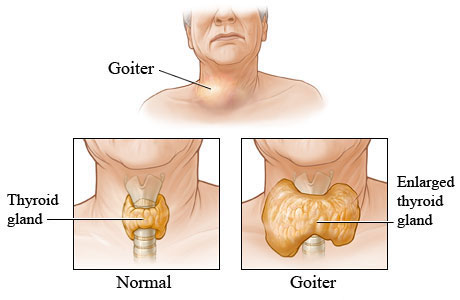The thyroid is an endocrine gland that produces the thyroid hormones. Most people confuse it to be a swelling of the neck or with the illness called as hypothyroidism.
The most common disorder of the thyroid gland is hypothyroidism. In most of the cases it is due to an autoimmune cause which means that the body’s own immune system is acting upon the thyroid gland and destroying it. Treatment generally comprises of replacement of the hormone made by the gland.
Another important disorder is hyperthyroidism. In this illness, the thyroid gland releases more of the hormones. It can again be autoimmune or due to a thyroid gland tumour that is producing more hormones. However in many cases it is due to temporary injury to the thyroid gland and requires no treatment.
In many cases the thyroid gland enlarges in size causing a visible lump in the throat. A clinical pointer is that this swelling moves while swallowing. Evaluation of this lump by an expert is important as this can be due to an underlying thyroid cancer.
Thy symptoms of hypothyroidism include weight gain, swelling of limbs, puffiness of face, decreased stool frequency, decreased energy levels, menstrual disturbances, swelling of neck (also called goitre), dry skin, hair fall etc . However majority of the milder cases do not have any symptoms and are detected only on testing.
Thyroid function is assessed by a test called as thyroid profile. In this the following hormones are assessed –
– Thyroid stimulating hormone (TSH)
– Triiodothyronine (T3)
– Tetraiodothyronine (T4)
An increase in the levels of TSH beyond your lab cutoff (or usually > 5 mIU/L) suggests hypothyroidism. In most cases the T3,T4 are normal. However in more severe cases T3,T4 can be decreased. Visit your local endocrinologist for appropriate interpretation of your thyroid profile.
The general treatment of hypothyroidism comprises of replacement with levothyroxine. Treatment of autoimmune hypothyroidism is generally required lifelong. Some of the precautions to take are:
– Take your medication after at least 4 hours of fasting (Preferably early morning)
– Wait for 30-45 minutes to have food after you take your tablet
– If you are taking calcium or iron tablets take them 4 hours after your thyroid tablet
– If you forget to take your tablet, take two tablets the next day
Meet your endocrinologist to fine tune your levothyroxine requirements.
The dietary items that interfere with thyroid hormone synthesis and cause enlargement of the gland are called goitrogens. Some of the common goitrogens are soy flavones and vegetables that are members of the brassica family such as cabbage and cauliflower. However these goitrogens interfere only when consumed in large amounts. Furthermore, no restriction is necessary if you are already on treatment for hypothyroidism.
Thyroid control during pregnancy is of utmost importance since abnormal thyroid hormone status can affect both the mother as well as the child. Poor control of thyroid hormone status during pregnancy is known to affect the mental development of the child in the long run.
Generally the patient is advised to take two extra tablets of levothyroxine per week if she gets pregnant. However it is recommended to visit your endocrinologist if you get pregnant for appropriate dosage adjustment.
Hyperthyroidism is a condition where the thyroid gland makes more of the thyroid hormones. The presence of increased thyroid hormone levels in the blood is called as thyrotoxicosis. In most cases hyperthyroidism is due to a condition called as Graves’ disease. Some of the features of Graves; disease are:
– Tremors (Involuntary shaking of hands)
– Anxiety
– Palpitations (Rapid heart beat)
– High blood pressure
– Increased appetite
– Increased stool frequency
– Weight loss
– Protrusion of the eyes
– Swelling of the legs
In many cases of thyrotoxicosis, the cause is not due to hyperthyrodism but is due to the release of thyroid hormones from a recently damaged gland. This condition is called as subacute thyroiditis. This condition does not require any treatment.
Graves’ disease can be treated by drugs, radioactive iodine or by surgery. Meet your endocrinologist to know what treatment you will be needing.
Most of the thyroid swellings (or goitres) are benign i.e non cancerous. They are generally associated with hypothyroidism and do not require any specific treatment per se.
However if your endocrinologist palpates your swelling and suspects you to have a tumour he/she will likely ask you for an ultrasound of the swelling and/or a fine needle aspiration cytology(FNAC) of your swelling, In cases where a cancer is suspected you might have to go for surgical options to remove the tumour. In other cases regular followup of the swelling may be enough.



